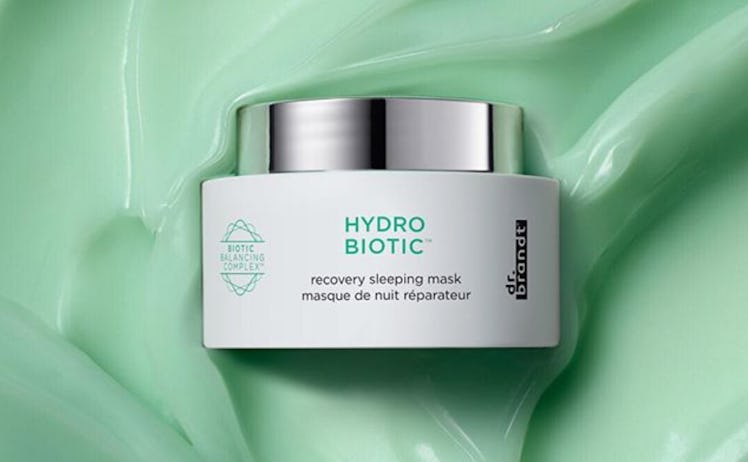
Probiotic Skincare Is Trending Hard & Here's Why You Should Slather Your Face In Bacteria
I grew up thinking bacteria was bad for my skin. "It causes breakouts," they warned. "Your skin will become inflamed," they said. Now, a dozen years after my puberty-caused acne has cleared, I'm being told that not all bacteria are bad for my skin. In fact, these probiotic skincare benefits prove that the right kind of bacteria, the "good kind" of bacteria, can leave your skin glowing, soothed, and better than ever.
The first time I had even heard of probiotics was nearly five years ago when I went vegan for the first time. My best friend, holistic wonder, and vegan spirit guide advised me to buy a bottle of probiotic pills from Whole Foods to help aid my digestive system during the dietary transition. In the years following, probiotic became a big buzzword in healthy-eating circles. Yogurt, kombucha, and plenty other nutrition-driven brands have proudly brandished the word "probiotic" on their packaging as a badge of honor. What do probiotics actually do for you, though, and why are our favorite skincare brands latching on to this craze?
In an interview with XoJane, gastroenterologist Dr. Roshini Raj dispelled the notion that bacteria can only be harmful for skin.
Topical probiotics help strengthen the skin’s natural defense mechanisms, making it more resistant to damage from environmental stressors. By forming a protective shield on the skin’s surface, they also stop your cells from "seeing" or reacting to bad bacteria and developing inflammation, which may age your skin and aggravate acne or rosacea. Probiotics may also help improve the appearance of fine lines and wrinkles so they can be effective at fighting the signs of aging. Probiotics also help with skin conditions such acne, rosacea or eczema thanks to their ability to secrete anti-inflammatory and anti-bacterial substances. In fact, the American Academy of Dermatology called probiotics a new beauty breakthrough for their skin healing, calming, and anti-microbial benefits.
In short, probiotic skincare adds "good" bacteria back onto the surface of the skin to protect the surface from "bad" bacteria and other free radical damage (like pollution). Probiotics can help to treat a number of skincare concerns, from acne, eczema, rosacea, and sensitivity, to major anti-aging concerns. If you have any major skincare concern, it seems that probiotics will help your skin to live its best life. As dermatologist Dr. Francesca Fusco told Vogue, “For skin, probiotics work in a similar way as they do for the digestive system. They help it [to] remain in a balanced state.” No more worrying about the smog in New York City or how you accidentally touched your face after holding on to a germ-riddled subway pole. Probiotics will help to fight off all the evil your environment will throw at you.
Now there are a couple ways you can utilize probiotics to aid your skin's health. First, you can consume them. The Hum Nutrition Gut Instinct Pills ($25; humnutrition.com) boast benefits to your skin, as well as your digestion and immune systems. The Beauty Chef also offers its Glow Advanced Inner Beauty Powder ($70; sephora.com), which you can mix with your water and drink to promote healthy skin, hair, and nails.
Of course, you can apply your probiotics topically as well. Start off by cleansing with Elizabeth Arden's Probiotic Whip-to-Clay Cleanser ($34; elizabetharden.com), which gently cleanses away makeup and debris, while prepping the skin for the rest of your routine. The Beauty Chef also makes a Probiotic Skin Refiner ($75; shop.nordstrom.com) which nourishes and exfoliates the skin. Our favorite brand The Ordinary also makes a serum called Buffet ($15; sephora.com), which will allow you to test drive the awesome benefits of probiotics for a fraction of the average price. If you're looking to hydrate, then try the Biossance Squalane + Probiotic Gel Moisturizer ($52; sephora.com). This product works overtime to reduce the effects of daytime stressors on the skin. If you rather get your probiotics in mask form, you can also try the H2O+ Beauty Rapids Soothing Probiotic Bubble Mask ($6; h2oplus.com), which will help you fizz and bubble your way to healthier skin. If you want to really snap your skin back into shape, you can utilize probiotics internally and topically with the Nerium Prolistic Lotion & Probiotic Powder Combo Pack ($90; nerium.com), which will help to nourish your skin from the inside out.
I recently started using the Dr. Brandt Hydro Biotic Recovery Sleeping Mask ($52; sephora.com), and I can honestly say my super sensitive and red skin feels soothed and nourished immediately after application. When I wake up in the morning, my skin is significantly less inflamed, making makeup application a dream. Who knew we'd actually want bacteria on our skin? Now I can't imagine surviving without the tiny microbiome living on my face.